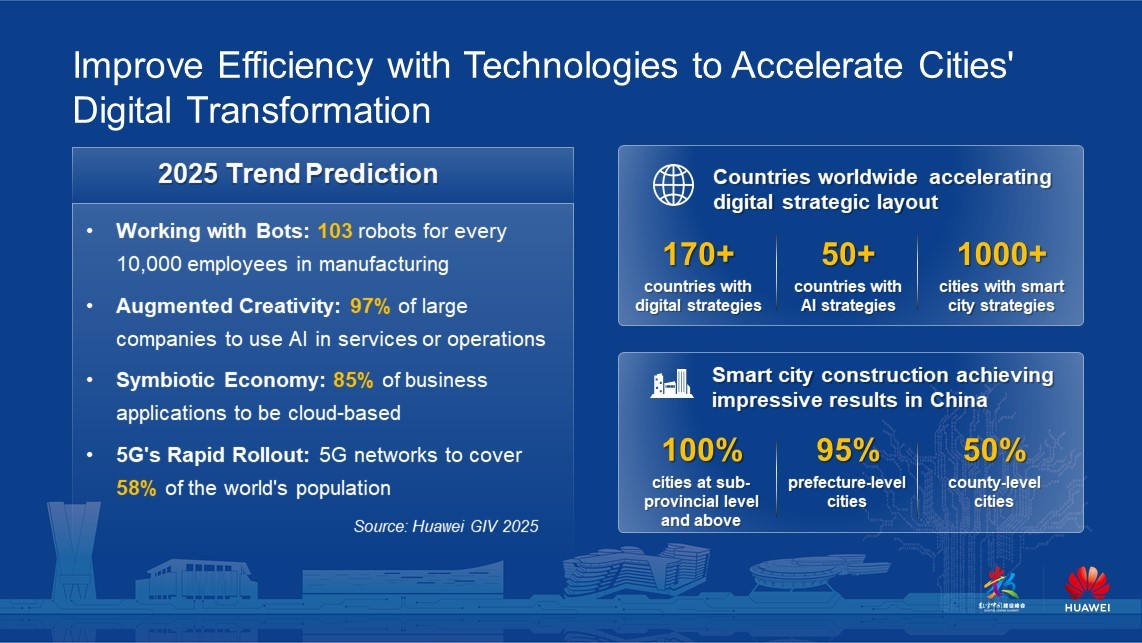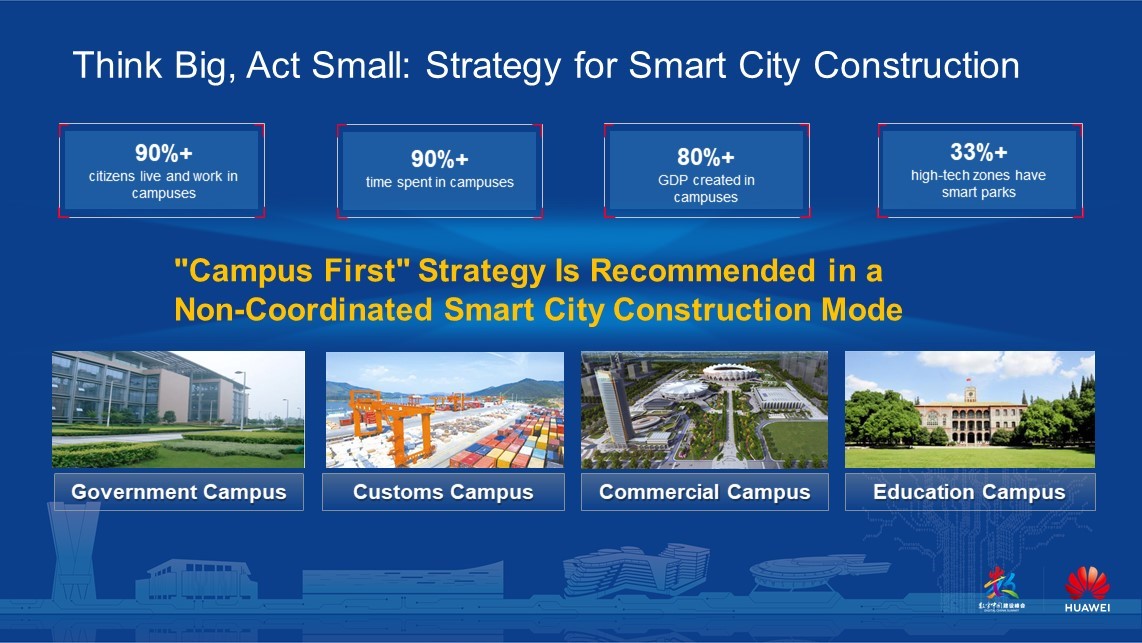This site uses cookies. By continuing to browse the site you are agreeing to our use of cookies. Read our privacy policy>
![]()
This site uses cookies. By continuing to browse the site you are agreeing to our use of cookies. Read our privacy policy>
![]()
Enterprise products, solutions & services
[Fuzhou, China] On April 25, during the 4th Digital China Summit, the Digital Silk Road & China – ASEAN Smart City International Cooperation Forum was held in Fuzhou, China. Representatives of governments, cities, and enterprises from China and ASEAN countries shared their experience in building smart cities at the event aimed at deepening consensus on smart city cooperation between China and ASEAN countries.
Thomas Xu, President of Huawei Global Government Sales, attended the forum and delivered a speech entitled "Accelerating Public Sector Transformation through Smart Campus". He said that the trend toward "improving efficiency with technologies to accelerate cities' digital transformation" has already built up overwhelming momentum. He called on city managers, solution providers, and city service operators to embrace changes and apply digital technologies to build the homes of the future.

Thomas Xu, President of Huawei Global Government Sales, speaking at the event
Drawing on Huawei's extensive experience in building smart cities at home and abroad, Thomas Xu made two recommendations for ASEAN countries building smart cities.
1. Cloud First. A smart city requires a powerful digital foundation. Smart city services require elasticity, agility, and security, making cloud the best choice.
2. Campus First. When building a smart city, one must think big but act small. The process begins with coordinated planning and the creation of a unified blueprint, before finding methods of implementation appropriate to the city's management system and stage of development. In the absence of a highly coordinated approach to smart city construction, "campus first" could be the right strategy to pursue.
The full text of the speech:
Distinguished leaders and guests, ladies and gentlemen, good afternoon! It's a great pleasure to be with you in the beautiful city of Fuzhou – the city of banyan trees, to share our thoughts on smart city construction and discuss cooperation opportunities in ASEAN countries. I'd like to first express my thanks to the organizers for building this wonderful platform.
The topic I will speak on is "Accelerating Public Sector Transformation through Smart Campus".
I want to first show you some figures that illustrate the trends and progress of smart city.

The 2025 forecast on the left comes from Huawei Global Industry Vision (GIV) 2025, and it shows Huawei's perspective on the role of the ICT industry in a smart world and the opportunities involved. There is no doubt that the rapid development of 5G and AI technologies and the rise of human-machine collaboration and symbiotic economy will change the way people communicate, work, and live. City managers, solution providers, and city service operators should embrace changes and apply digital technologies to build the homes of the future.
Countries around the world are defining their digital strategies at an ever faster pace, eager to seize the opportunities for growth. Over 170 countries have published digital strategies, over 50 have published AI strategies, and over 1000 cities have unveiled their smart city strategies.
China started building smart cities in 2012, and has achieved impressive results. 100% of the cities at sub-provincial administrative level and above (or 19 of China's largest cities), 95% of the prefecture-level cities and 50% of the county-level cities have kicked off their smart city construction. Some of China's largest cities, such as Beijing, Shanghai, Shenzhen, and Guangzhou, lead the world in terms of smart city development.
The trend toward improving efficiency with technologies to accelerate cities' digital transformation has already built up overwhelming momentum.
In China, smart city construction is well underway. In its booming digital economy, innovative applications are constantly being created, and data is growing explosively, including service data, video data, and 3D map data. The changes are not just in quantity, but also quality. As services become increasingly diverse, data needs to be converged across geographical regions, departments and systems. Conventional distributed information infrastructure is not up to the task of meeting future needs.
A smart city requires a powerful digital foundation – a platform that is agile, innovative, secure, and collaborative.
Smart city services require elasticity, agility, and security, making cloud the best choice.
HUAWEI CLOUD is committed to building the strongest foundation for an intelligent world, and provides four kinds of enablement capabilities – data, application, platform, and ecosystem.
• Data is an empowering force. HUAWEI CLOUD Stack's intelligent data lake enables cities to collect, process, analyze, and converge different types of data, so as to supply high-quality data for smart city applications.
• Its open enablement platform provides advanced services, such as AI, big data, and IoT, to facilitate the development and expansion of applications.
• HUAWEI CLOUD and its 90,000 partners worldwide together provide the driving force behind cities' digital transformation.

Governments worldwide have turned their attention to migrating government services to cloud. Take Singapore as an example. Last year, the Singapore government defined a five-year cloud migration plan and signed contracts worth more than US$620 million to bring more services to cloud. HUAWEI CLOUD acted swiftly and deployed 13 nodes around the world, including nodes in Singapore and Bangkok, Thailand for the Southeast Asia region. Huawei is ranked the second largest cloud service provider in China, and fifth globally.
To smart city initiatives outside China, our recommendation is to think big and act small, starting from coordinated planning and a unified blueprint, before finding methods of implementation appropriate to the city's management system and stage of development.

Based on Huawei's extensive experience in building smart cities at home and abroad, we believe that in the absence of a highly coordinated approach to smart city construction, "campus first" could be the right strategy to pursue.
In a city, everything except the roads can be considered a campus of some sort. Over 90% of residents work and live in campuses, and 80% of GDP is produced in campuses. Campuses are the basic unit that make up a city. The goal of the "campus first" strategy is to bring intelligence to these basic units. There are many types of campuses, each presenting vastly different scenarios. Public administration campuses include government offices, science and technology parks, and new smart towns. Customs campuses include border crossings, special regulation zones, and sea and air ports. Education campuses include universities, middle schools, primary schools, training centers, and research institutions.
Huawei offers smart campus solutions that can meet the requirements of all these scenarios, capable of building scenario-specific solutions with intelligent sensing, connectivity, cloud, big data, GIS, and AI technologies. The key for government office campuses is making office work easier and management more efficient. For the customs campuses, facilitating cross-border trade and ensuring security are the top concerns. The priorities of education campuses are educational resource sharing, experience innovations, campus security, and providing one-stop services for faculty and students. The scenario-based solutions greatly improve productivity and service experience. For example, at Shenzhen Liantang Port, a big data-based customs risk control system was deployed. Vehicles identified as highly compliant can clear customs in 10-20s, instead of the 3 to 5 minutes it took in the past, and the age-old issue of congestion at the border has been solved.
To date, Huawei has participated in the digital transformation of more than 700 cities around the world and accumulated valuable practical experience. In the past five years, more than 20 cities supported by Huawei won international smart city awards, including Shenzhen and Shanghai in China, Yanbu, Saudi Arabia and Rustenburg, South Africa.
Looking ahead, we will continue to practice the "platform + ecosystem" strategy. We will optimize the ecosystem, develop more scenario-specific solutions with partners, and share successful experience of leading cities to help more in their digital transformation journey.
In the end, I'd like to sum up the key takeaways.
1. The trend toward improving efficiency with technologies to accelerate cities' digital transformation has now built up overwhelming momentum.
2. Smart city services require elasticity, agility and security, making cloud the best choice.
3. Think Big, Act Small. In the absence of a highly coordinated approach to smart city construction, "campus first" could be the right strategy to pursue.
4. Huawei is dedicated to providing the most powerful digital foundation, a comprehensive ecosystem, and rich practical experience to power the digital transformation of cities around the globe.
Thank you!